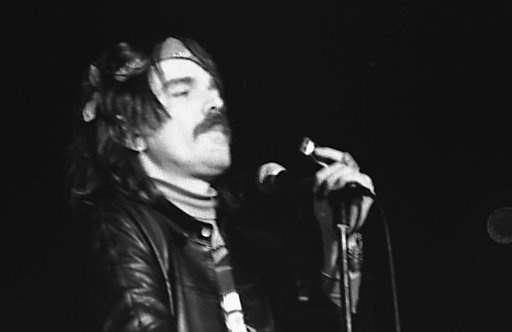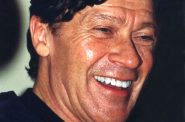The Peculiar Joys of Captain Beefheart
He’s not for everybody. And not like anyone else.

Captain Beefheart. Photo by Jean-Luc, (CC BY-SA 2.0), via Wikimedia Commons.
I understand anyone who finds Captain Beefheart’s (born Don Van Vliet) music hard to listen to. He’s not reined in by any musical convention. Time signatures? Forget it. He marches to his own drummer, the one that sounds like his kit has hiccups. Chord progressions play almost no role in his songs; his songs are more like intertwined melodies and often land on dissonant notes with all the confidence of the untrained. His lyrics are a wonderland of dream images, ridiculous wordplay and, thank God… they’re hilarious, so it’s not some kind of humorless prog experiment. It’s the well honed looniness of his poetry that escorts you into the deranged amusement park that is the Captain’s mind.
I’m offering “Her Eyes Are A Blue Million Miles” as a gateway to the stuff that’s further out. Listen to it and you might develop a taste for this wizard’s magic. This one’s located about halfway between Beefheart’s most chaotic work and something we might recognize as a one chord blues song. Blues is the closest you can get to describing his voice, which sounds a heck of a lot like the great Howlin’ Wolf’s. Wolf, of course, was not known for subtlety or restraint. He was an alpha dog in Chicago, a town that produced its fair share of authoritative singers. Beefheart picked up on his red hot intensity and crazy commitment to the lyrics and took it somewhere entirely new.
Van Vliet was an interesting character, to say the least. He went to high school with Frank Zappa and even played with him in a band. Later he sang on Zappa’s tune Willie The Pimp, a winning performance that probably put a lot of Mothers of Invention fans on to him. Then came Trout Mask Replica, an album like nothing the world had heard before. The fact it was even made is amazing: it’s an experiment in every sense of the word, an attempt to re-invent music that mostly succeeds. But easy listening, it wasn’t. Atonal and chaotic, it screeches and screams and is harsh sounding on the first listen. To this day critics cite it to gain instant credibility.
Captain Beefheart was also a seriously talented visual artist. He spent most of his free time painting, drawing inspiration for his near abstractions from the natural world. He was no dabbler, winding up in later life at the prestigious Mary Boone Gallery. The connection between his music and art is easy to see — he created a scrambled world put back together in the wrong order whether he was holding a microphone or a paintbrush.
Your heroes borrow heavily and manage to mix and match influences to come up with something all their own. That makes sense — we all have to learn and why not imitate the best? When these influences aren’t disguised well enough or are too obviously one artist in particular, you’re treading on thin water. In the worst cases it’s fair to cry plagiarism — and to be clear, I am not accusing Tom Waits of that. He’s a true original if there ever was one. Like Beefheart, he was influenced by Wolf and others. Both had their share of success and never went anywhere near the mainstream. For Beefheart, a one-time visitor to our planet, the stream of consciousness was much more interesting.
If you think stories like this are important, become a member of Urban Milwaukee and help support real, independent journalism. Plus you get some cool added benefits.
Sieger on Songs
-
The Legacy of Robbie Robertson
 Sep 28th, 2023 by John Sieger
Sep 28th, 2023 by John Sieger
-
Bill Nighy Sings ‘The Rowan Tree’
 Apr 12th, 2023 by John Sieger
Apr 12th, 2023 by John Sieger
-
Burt Bacharach Was A Suave Throwback
 Mar 20th, 2023 by John Sieger
Mar 20th, 2023 by John Sieger






















Hi, John! (We met at Cafe in Fort Atkinson). Thanks for this amazing piece. Can’t wit to hear this guy! Have a great day!
June (a friend of Bruce Schwartz)